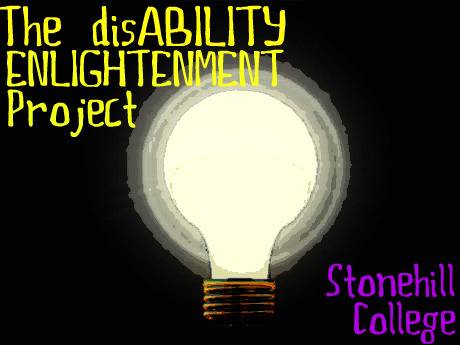I first encountered this question when I came back from a semester in Washington, eager to embark on a disABILITY awareness campaign at Stonehill. Martha Ucci, director of Academic Achievement, gave me this toolkit to help me start my project off. University of Hawai'i- Manoa has an awesome disability studies program. A group from the university that calls themselves "Team Access" created this set of project ideas that would educate a group of people- most likely a college campus, about disabilities and this project would hopefully sustain itself longer than just a one day event.
Anyway, the recurring theme in this toolkit designed by "Team Access" was "Think About How You Disable Others..." One of the ideas they offered was to send out post cards around campus and this one expanded on the idea of disabling others:

"Thinking about how you disable others" could be a number of things. It could be carrying false assumptions, like the idea that people with learning disabilities are stupid or that people who are blind need help with everything. It also could be by your actions, like blocking a ramp by locking your bike on it (which I have seen done MANY times at Stonehill...)
Disabling others is something that isn't just done to people that possess society's notion of something that is considered a physical or mental disability. I've talked before about how the language we use can disable others, but that isn't even the half of it. You can disable people by smirking and laughing when they speak up during class. You can disable people by talking about them behind their back. You can disable people by avoiding and not including them. You can disable people by having preconceived ideas about their abilities. You can disable people by oppressing and abusing them. Get the picture? There are so many ways you can disable people from living happy, accomplished, and fruitful lives.
Professor Dahlin has mentioned in Disability? before that we do not know much of what the people who surround us have been through in their lives. I think this humbles us and is why we need to be more open and put more thought into what we say and how we behave, because our words and our actions have the potential to disable others.
On another note, the blog is officially up on Stonehill's website!

No comments:
Post a Comment